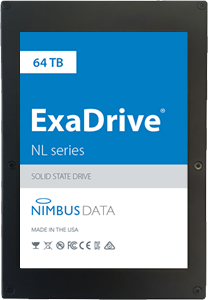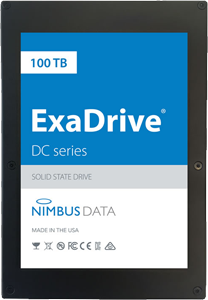Patent-pending Multicore Architecture
Existing SSDs use a just one flash controller, limiting capacity and endurance. ExaDrive SSDs, on the other hand, use a patented multiprocessor architecture with up to four internal flash controllers. A logic processor evenly distributes IO across the flash controllers, dynamically adjusting power to each controller to deliver optimal performance. This innovative architecture gives ExaDrive SSDs much higher capacity, better endurance, more balanced read/write performance, and superior energy efficiency.
ExaDrive NL: The #1 Enterprise QLC Flash SSD
With ExaDrive NL, organizations can cost-effectively migrate from hard drives to flash storage, accelerating data access and reducing power consumption, all while preserving existing storage and server hardware. Using enterprise-grade QLC flash, ExaDrive NL offers 4x higher capacity and substantially better reliability than nearline hard drives, offering a compelling TCO and cost-per-gigabyte relative to competing enterprise SSDs. ExaDrive NL offers an industry-standard SATA interface and has been tested with systems from major vendors, including Dell, HPE, Lenovo, Cisco, and Supermicro.

ExaDrive DC: The World’s Highest Capacity SSD
ExaDrive DC is expressly designed for capacity storage use cases that demand the greatest reliability, highest density, and lowest power consumption. As the only SSD to offer unlimited endurance for 5 years, ExaDrive DC offers peace of mind that competing SSDs cannot, ensuring solid performance regardless of your workload. As the world’s highest capacity SSD, ExaDrive DC offers over 12x the capacity of the next largest SATA SSD on the market while consuming 85% less power per terabyte. ExaDrive DC is available in 100, 50, 32, or 16 TB capacities using enterprise-grade flash with end-to-end data protection.

Why 3.5 Inch / LFF and SATA?
ExaDrive is plug-and-play compatible with virtually any server designed for 3.5” HDDs. Today, there are over 1 billion 3.5” SATA/SAS slots in production, and HDDs will continue to fulfill a role for “cold” data storage requirements and archives due to their low cost. By matching the form factor and interface of HDDs, ExaDrive SSDs offers something that NVMe SSDs cannot – the ability to seamlessly mix-and-match HDDs and SSDs in the same system, facilitating tiered or hybrid storage infrastructures. This approach preserves existing server investments, reduces cost, and simplifies capacity forecasting.
Superior Density Delivers Dramatically Lower TCO
For decades, server vendors have optimized rack density around the 3.5” form factor of HDDs. Today, with ExaDrive and high-density enclosures, customers can achieve up to 2.5 PB of capacity per rack U, or over 100 PB (petabytes) per industry-standard 42U rack cabinet, about 6x what is achievable with competing SSD technology. At the same time, ExaDrive uses up to 85% less power per TB than competing SSDs, reducing energy and cooling costs dramatically.
